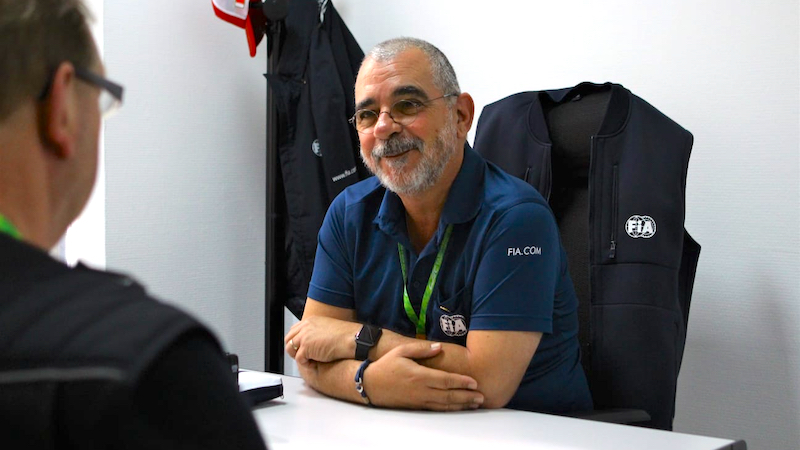Every World Endurance Championship fan will know his name, and his voice on team radio. WEC Race Director Eduardo Freitas has been an ever-present in the series since its inception in 2012. But what does his job actually entail? We sat down with his to find out.
From team mechanic to race director
It’s difficult to imagine how you can become a race director in a world championship. It’s not something you can learn, neither do job openings arise that you can apply for. In Eduardo Freitas’ case, it was more of an organic process as he rose through the organisational ranks.
“I can’t say that becoming a race director was ever in my mind when I was younger,” Freitas explains. “I used to help my friends working on two-stroke engines and soon decided to become a mechanic. That all changed in 1979, when I saw Peter Koene become World Karting Champion at Estoril. I realised that being a mechanic wasn’t for me, and decided to realign my future ambitions.”
“I know I wanted to work in motorsport, but not directly on the cars. I began looking into marshalling and learning the safety side of motorsport. Everyone has ambitions and wishes to progress in their career, and I progressed in my career from trainee track marshal all the way to where I am now.”
“We are the WEC’s police force”
The Race Director is one of the few individuals not driving cars who fans and spectators get to listen to during the race. Eduardo Freitas is synonymous with rules, penalties and safety car deployment, but he is just one member of a large group of people who make decisions collectively.
Behind the scenes it’s all about teamwork. Race direction is making sure everything runs smoothly during the race. Besides the race director there is also a team of series promoters, stewards and marshals to assist in the decision-making. But Eduardo Freitas is the man at the helm.
“I think the job of race director is best compared to that of a policeman,” Freitas says. “We have to be on permanent alert for safety and driver behaviour. It takes a great deal of concentration and focus, and you certainly know you’ve done hard day’s work at the end of an eight-hour race!”
“Funnily enough things are a little more relaxed at the 24 Hours of Le Mans. I spend the majority of the race in position, but it’s not possible or safe for someone to have that level of responsibility for 24 hours straight. I am replaced by the clerk of the course every so often so I can take a break and get some rest. It’s hard to be up, smart and alert for 24 hours.”
Handing out penalties
One of the main jobs of a race director is to act as an intermediary between the various parties at the track. If a driver or team breaks a rule during the race, Eduardo Freitas submits a report to a special team of stewards in the next room. The stewards then discuss the incident and check whether a penalty needs to be handed out. (This article on the WEC website provides an exciting glimpse at the role of the stewards).
“Imposing penalties is a very democratic system,” Freitas says. “If I or one of my colleagues notice something, we report to the stewards immediately. Usually the stewards are a team of four people, and they take as long as they need to look at the incident. It’s not up to me to decide the penalty, but often the stewards will ask for my opinion or we find a solution together.”
“Sometimes situations are too complex to make a reliable decision during the race,” he adds. “In these cases we wait until the drivers exit the cars and then talk to them face to face. Their statements are taken into consideration in the decision-making process and, in most cases, a post-race penalty is awarded. It’s rare that all parties are satisfied with our decision and often there will be a need for discussions. It’s my job to seek dialogue.”
Neutrality: a fine line?
Everyone who follows sport will have a favourite driver, player or team. But how is it possible to remain neutral and make fair decisions?
“I have always been fascinated by anything with an engine it in, and I love technology and speed,” says Freitas. “My favourite team, however, is far removed from the motorsport paddock: I am a supporter of Sporting Clube de Portugal, a football team based in Lisbon. In my area of work it wouldn’t be fair to be a fan of a motorsport team, so I strictly separate my work and my love of motorsport. This is the only way to stay neutral and make fair decisions.”
“Nonetheless I still love sport and love to play myself. I tried to get into motorcycle racing and I respect the riders immensely, but the whole thing goes against my standards of safety! I find it a little bit too risky. I prefer to play badminton and ocassionally also snooker, when I have the time. I like to watch sport on TV, regardless of what it is really.”
Teamwork is everything
The work of a race director is all about compromise, communication and flexibility. The race director is undoubtedly one of the most important cogs in the WEC machine, but without teamwork the series wouldn’t exist at all.
“At the end of a race weekend I am happy if everyone returns home in one piece,” Freitas says. “Only then can you know that we worked well as a team and made the right decisions. Still some days I wish I could make the drivers “indestructable” and eliminate the risk of someone getting hurt. I still believe we are on the right track to make every WEC race that little bit safer.”

